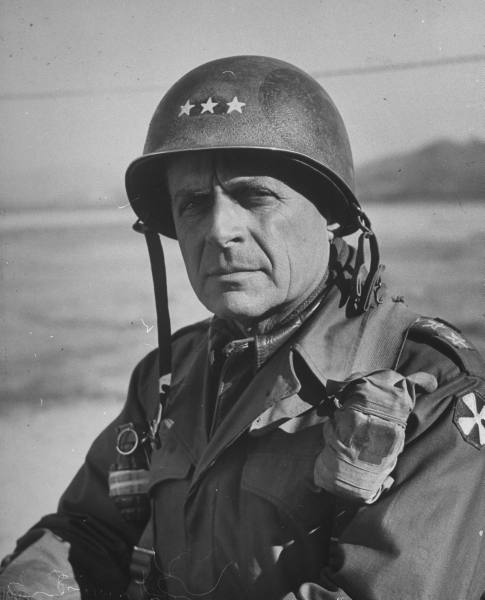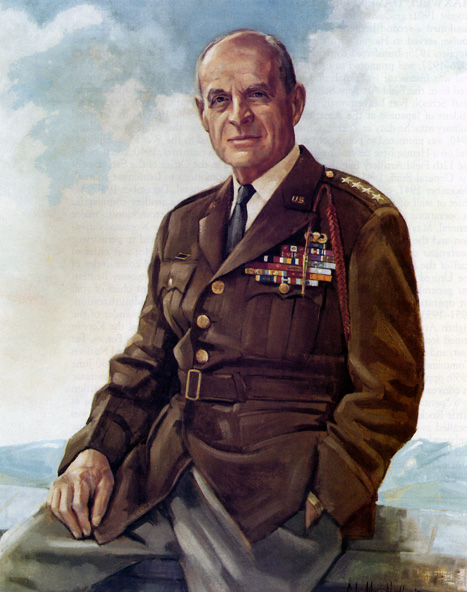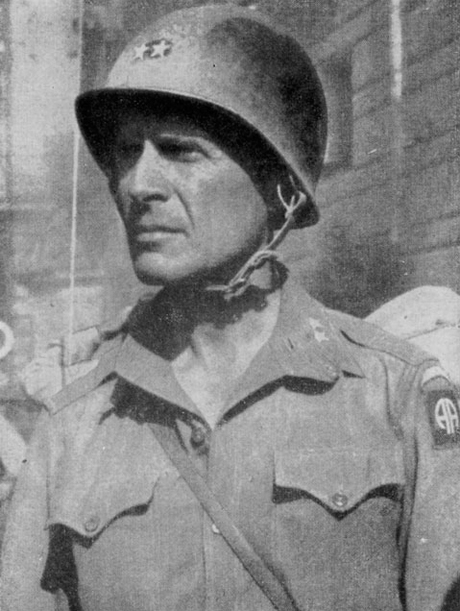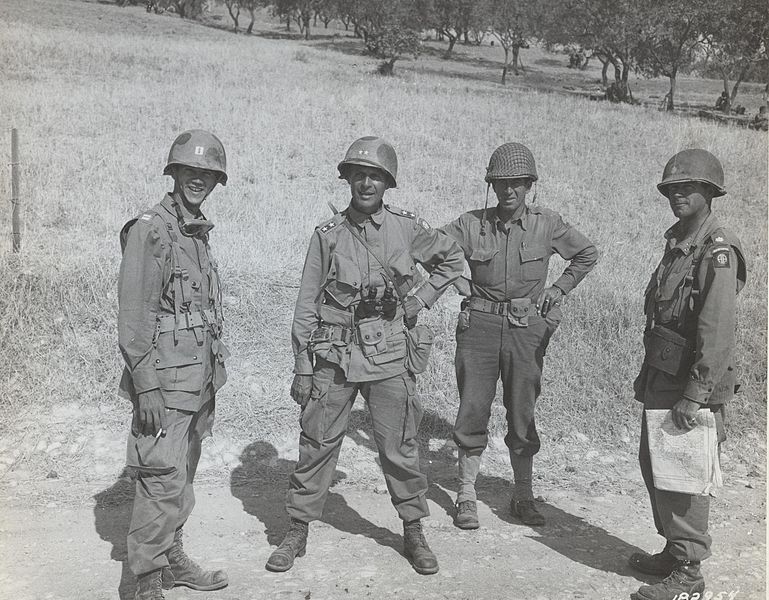<Back to Index>
- Economist Ragnar Anton Kittil Frisch, 1895
- Composer Louis Charles Bonaventure Alfred Bruneau, 1857
- General of the U.S. Army Matthew Bunker Ridgway, 1895
PAGE SPONSOR



Matthew Bunker Ridgway (March 3, 1895 – July 26, 1993) was a United States Army General. He held several major commands and was most famous for resurrecting the United Nations (U.N.) war effort during the Korean War. Several historians have credited Ridgway for turning around the war in favor of the UN side. His long and prestigious military career was recognized by the award of the Presidential Medal of Freedom on May 12, 1986 by President Ronald Reagan, who stated that "Heroes come when they're needed; great men step forward when courage seems in short supply."
Matthew Ridgway was born March 3, 1895 in Fort Monroe, Virginia, to Colonel Thomas Ridgway, an artillery officer, and Ruth Ridgway. He lived in various military bases all throughout his childhood. He later remarked that his "earliest memories are of guns and Marching men, of rising to the sound of the reveille gun and lying down to sleep at night while the sweet, sad notes of 'Taps' brought the day officially to an end."
He graduated in 1912 from Boston English High School in Boston and applied to West Point because he thought that would please his father (who was a West Point graduate).
Ridgway failed the entrance exam the first time due to his inexperience with mathematics, but after intensive self-study he succeeded the second time. At West Point he served as a manager of the football team. In 1917, he was commissioned a Second Lieutenant in the U.S. Army. The same year he married Julia Caroline Blount. They had two daughters, Constance and Shirley, and divorced in 1930.
A year after he graduated, he was assigned to West Point as an instructor in Spanish. He was disappointed that he was not assigned to combat duty in World War I, feeling that "the soldier who had had no share in this last great victory of good over evil would be ruined."
During 1924 – 1925 Ridgway attended the company officers' course at the United States Army Infantry School in Fort Benning, Georgia, after which he was given command of a company in the 15th Infantry in Tientsin, China. This was followed by a posting to Nicaragua, where he helped supervise free elections in 1927.
In 1930, he became an advisor to the Governor - General of the Philippines. He graduated from the Command and General Staff School at Fort Leavenworth, Kansas, in 1935 and from the Army War College at Carlisle Barracks, Pennsylvania, in 1937. During the 1930s he served as Assistant Chief of Staff of VI Corps, Deputy Chief of Staff of the Second United States Army, and Assistant Chief of Staff of the Fourth United States Army. General George Marshall assigned Ridgway to the War Plans Division shortly after the outbreak of World War II in Europe in September 1939. He served in the War Plans Division until January 1942, and was promoted to brigadier general that month.
In August 1942, Ridgway was promoted to major general and was given command of the U.S. 82nd Airborne Division upon Omar N. Bradley's assignment to the 28th Infantry Division.
The 82nd, having already established a combat record in World War I,
had earlier been chosen to become one of the army's five new airborne
divisions. The conversion of an entire infantry division to airborne
status was an unprecedented step for the U.S. Army, and required much
training, testing, and experimentation.
Unlike his men, Ridgway did not first go through airborne jump school before joining the division. Ridgway successfully converted the 82nd into a combat ready airborne division; he remained in command and eventually earned his Paratrooper wings.
Ridgway helped plan the airborne invasion of Sicily in July 1943, and commanded the 82nd in combat there. During the planning for the invasion of the Italian mainland, the 82nd was tasked with taking Rome by coup de main in Operation Giant II. Ridgway strongly objected to this unrealistic plan, which would have dropped the 82nd on the outskirts of Rome in the midst of two German heavy divisions. The operation was cancelled only hours before launch. In 1944, Ridgway helped plan the airborne operations of Operation Overlord, the Allied invasion of Europe. In the Normandy operations, he jumped with his troops, who fought for 33 days in advancing to Saint - Sauveur - le - Vicomte near Cherbourg (St Sauveur was liberated on June 14, 1944).
In September 1944, Ridgway was given the command of the XVIII Airborne Corps which was deployed in Operation Market Garden. The XVIII Airborne Corps also helped stop and later push back German troops during the Battle of the Bulge. In March 1945, he led his troops into Germany during Operation Varsity, and was wounded in the shoulder by German grenade fragments on March 24, 1945. In June 1945 he was promoted to lieutenant general. At war's end, Ridgway was on a plane headed for a new assignment in the Pacific theater, under General of the Army Douglas MacArthur, with whom he had served while a captain at the United States Military Academy at West Point.
Ridgway was a commander at Luzon for some time in 1945 before being given command of the US forces in the Mediterranean Theater, with the title Deputy Supreme Allied Commander, Mediterranean. From 1946 to 1948, he served as the U.S. Army representative on the military staff committee of the United Nations. He was placed in charge of the Caribbean Command in 1948, controlling U.S. forces in the Caribbean, and in 1949 was assigned to the position of Deputy Chief of Staff for Administration under then Army Chief of Staff General J. Lawton Collins.
In December 1947 Ridgway married Mary Princess "Penny" Anthony Long, his third wife. They
remained married until his death 46 years later. In April 1949, their
only child, Matthew Bunker Ridgway, Jr., was born. Ridgway's son was
killed in an accident in 1971.
Ridgway's most important command assignment occurred in 1950, upon the death of Lieutenant General Walton Walker. He took over the 8th US Army, which had been deployed in South Korea upon the invasion by North Korea in June of that year. At the time, Ridgway was serving on the Army staff in the Pentagon as Deputy Chief of Staff for Operations and Administration.
When Ridgway took command, the Army was still in a tactical retreat, after a strong foray into North Korea had been met with an unexpected and overwhelming Communist Chinese advance. Ridgway was successful in turning around the morale of the Eighth Army.
Ridgway was not fazed by the Olympian demeanor of General Douglas MacArthur, then overall commander of UN forces in Korea. MacArthur gave Ridgway a latitude in operations he had not given his predecessor. After Ridgway landed in Tokyo on Christmas Day 1950 to discuss the operational situation with MacArthur, the latter assured his new commander that the actions of Eighth Army were his to conduct as he saw fit. Ridgway was encouraged to retire to successive defensive positions, as was currently under way, and hold Seoul as long as he could, but not if doing so meant that Eighth Army would be isolated in an enclave around the capital city. Ridgway asked specifically that if he found the combat situation "to my liking" whether MacArthur would have any objection to "my attacking". MacArthur answered, "Eighth Army is yours, Matt. Do what you think best."
Upon taking control of the battered Eighth Army, one of Ridgway's first acts was to restore soldiers' confidence in themselves. To accomplish this, he reorganized the command structure. During one of his first briefings in Korea at I Corps, Ridgway sat through an extensive discussion of various defensive plans and contingencies. At the end, he asked the staff about the status of their attack plans; the corps G–3 (operations officer) responded that he had no such plans. Within days, I Corps had a new G-3. He also replaced officers who did not send out patrols to fix enemy locations, and removed "enemy positions" from commanders' planning maps if local units had not been in recent contact to verify that the enemy was still there. Ridgway established a plan to rotate out those division commanders who had been in action for six months and replace them with fresh leaders. He sent out guidance to commanders at all levels that they were to spend more time at the front lines and less in their command posts in the rear. These steps had an immediate impact on morale.
With the entry of China, the complexion of the Korean War had changed. Political leaders, in an attempt to prevent expansion of the war, did not allow UN forces to bomb the supply bases in China, nor the bridges across the Yalu River on the border between China and North Korea. The American Army moved from an aggressive stance to fighting protective, delaying actions. Ridgway's second big tactical change was to make copious use of artillery.
China's casualties began to rise, and became very high as they pressed waves of attacks into the coordinated artillery fire. Under Ridgway's leadership, the Chinese offensive was slowed and finally brought to a halt at the battles of Chipyong-ni and Wonju. He then led his troops in a counter offensive in the spring of 1951.
When General Douglas MacArthur was relieved of command by President Harry Truman in April, Ridgway was promoted to full general, assuming command of all United Nations forces in Korea. As commanding general in Korea, Ridgway gained the nickname "Old Iron Tits" for his habit of wearing hand grenades attached to his load bearing equipment at chest level. Photographs however show he only wore one grenade on one side of his chest; the so-called "grenade" on the other side was in fact a first aid packet.
Ridgway also assumed from MacArthur the role of military governor of Japan. During his tenure, Ridgway oversaw the restoration of Japan’s independence and sovereignty on April 28, 1952.
In May 1952, Ridgway replaced General
Dwight D. Eisenhower as the Supreme Allied Commander, Europe (SACEUR) for the fledgling North Atlantic Treaty Organization (NATO).
While in that position Ridgway made progress in developing a
coordinated command structure, oversaw an expansion of forces and
facilities, and improved training and standardization. He upset other
European military leaders by surrounding himself with American staff.
His tendency to tell the truth was not always politically wise. In a 1952 review, General Omar Bradley, Chairman of the Joint Chiefs of Staff, reported to President Harry Truman that
"Ridgway had brought NATO to 'its realistic phase' and a 'generally
encouraging picture of how the heterogeneous defense force is being
gradually shaped.'"
President Eisenhower approved a waiver to the military’s policy of mandatory retirement at age 60 so Ridgway could complete his two - year term as Chief of Staff. However, disagreements with the administration mainly regarding the administration's downgrading of the army in favor of the navy, prevented him from being appointed to a second term. Ridgway retired from the US Army on June 30, 1955 and was succeeded by his one - time 82nd Airborne Division Chief of Staff, Maxwell D. Taylor. Even after he retired, Ridgeway was a constant critic of President Eisenhower.
Ridgway remained very active in retirement both in leadership capacities and as a speaker and author. He relocated to the Pittsburgh suburb of Fox Chapel, Pennsylvania, in 1955 after accepting the Chairmanship of the Board of Trustees of the Mellon Institute as well as a position on the board of directors of Gulf Oil Corporation among others. The year after his retirement, he published his autobiography, Soldier: The Memoirs of Matthew B. Ridgway. In 1967, he wrote The Korean War.
In 1960, he retired from his position at the Mellon Institute but continued to serve on multiple corporate boards of directors, Pittsburgh civic groups and Pentagon strategic study committees.
Ridgway continued to advocate for a strong military to be used judiciously. He gave many speeches, wrote, and participated in various panels, discussions, and groups. In early 1968, he was invited to a White House luncheon to discuss Indochina. After the luncheon, Ridgway met privately for two hours with President Lyndon Johnson and Vice - President Hubert Humphrey. When asked his opinion, Ridgway advised against deeper involvement in Vietnam and against using force to resolve the Pueblo Incident. In an article in Foreign Affairs, Ridgway stated that political goals should be based on vital national interests and that military goals should be consistent with and support the political goals, but that neither situation was true in the Vietnam War.
Ridgway advocated maintaining a chemical, biological, and radiological weapons capability, arguing that they could accomplish national goals better than the weapons currently in use. In 1976, Ridgway was a founding board member of the Committee on the Present Danger, which urged greater military preparedness to counter a perceived increasing Soviet threat.
On May 5, 1985 Ridgway was a participant in the Ronald Reagan visit to Kolmeshöhe Cemetery near Bitburg, when former Luftwaffe ace Johannes Steinhoff in an unscheduled act firmly shook his hand in an act of reconciliation between the former foes.
Ridgway died at his suburban Pittsburgh home at age 98 in July 1993 of cardiac arrest, holding permanent rank of General in the United States Army. He is buried at Arlington National Cemetery. In a graveside eulogy, Chairman of the Joint Chiefs of Staff General Colin Powell said: "No soldier ever performed his duty better than this man. No soldier ever upheld his honor better than this man. No soldier ever loved his country more than this man did. Every American soldier owes a debt to this great man."
During his career, Ridgway was recognized as an outstanding leader, earning the respect of subordinates, peers, and superiors. General Omar Bradley described Ridgway's work turning the tide of the Korean War as "the greatest feat of personal leadership in the history of the Army." A soldier in Normandy remarked about an intense battle while trying to cross a key bridge, "The most memorable sight that day was Ridgway, Gavin, and Maloney standing right there where it was the hottest [heaviest incoming fire]. The point is that every soldier who hit that causeway saw every general officer and the regimental and battalion commanders right there. It was a truly inspirational effort."
On the day of the Germans' furthest advance in the Battle of the Bulge, Ridgway commented to his subordinate officers in the XVIII Airborne Corps: "The situation is normal and completely satisfactory. The enemy has thrown in all his mobile reserves, and this is his last major offensive effort in this war. This Corps will halt that effort; then attack and smash him."
Ridgway
considered leadership to have three primary ingredients: character,
courage, and competence. He described character — including
self - discipline, loyalty, selflessness, modesty, and willingness to
accept responsibility and admit mistakes — as the "bedrock on which the
whole edifice of leadership rests." His concept of courage included
both physical and moral courage. Competence included physical fitness,
anticipating when crises will occur and being present to resolve them,
and being close to subordinates — communicating clearly and ensuring that
they are treated and led well and fairly.

